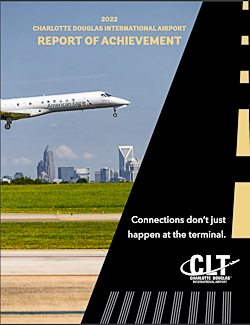Legalized Pot & Airports – Caught in the Middle?
As more states legalize the use of marijuana for medical or recreational use, more U.S. airports have found themselves caught in the middle of contradictory federal and state laws.
|
Dave Bannard is a partner with Kaplan Kirsch & Rockwell, a national law firm headquartered in Denver, with additional offices in New York City, Boston, San Francisco and Washington, D.C. Bannard concentrates his legal practice on representing airports in a wide variety of matters, including compliance with federal regulatory requirements. |
On one hand, marijuana remains a Class I controlled substance under federal law, and possession or distribution within the U.S. is banned. On the other, many states have legalized, and regulate, the use of pot within the state.
Within the boundaries of states that have legalized marijuana use, the federal government has generally declined to exercise its rights to prosecute. But when travelers possessing marijuana fly from a state where it is legal, they face a dilemma: Federal law governs U.S. airways and prohibits the possession
of pot.
When passing through federal security checkpoints, what are passengers to do? Moreover, what are airports to do?
U.S. cities and their airports have addressed this legal conflict in several ways. For instance, the city of Denver has simply banned possession of marijuana within Denver International Airport, even though it is otherwise legal in Colorado. Others, such as the city of Chicago, have installed “amnesty boxes” into which travelers with cold feet may deposit pot before passing through security. Some airports in states where marijuana has been legalized have not taken action at all, while others have embraced local legalization and allowed local pot shops to advertise within the airport.
The consequences for marijuana possession, of course, vary by state. TSA’s position, as stated on its website and in media interviews, is that it focuses on detecting security threats. TSA officers consequently do not search for marijuana at security checkpoints; but if any illegal substance, including marijuana, is found, TSA will refer the matter to local police.
What happens from there depends on local law and airport policy. Where marijuana has not been legalized, offenders are subject to arrest. Where marijuana is legal, however, possessors will often be told to dispose of the substance—either in an amnesty box or otherwise.
Recently, the most troubling issue has been travelers who carry marijuana onto planes that subsequently land where pot possession is prohibited and severe penalties for possession are imposed. At least one U.S. airport has been contacted by representatives of a foreign government and asked to take steps to stop travelers flying through that airport from bringing marijuana to their country.
What is an airport operator to do? As noted above, several approaches exist. The simplest, and perhaps most conservative, is to adopt Denver’s approach and ban pot within the airport. This not only simplifies decisions for frontline personnel, it also helps assure compliance with applicable federal requirements, including the Drug-Free Workplace Act.
Amnesty boxes are also becoming more popular, but airport operators need to think through how they will be secured, maintained and emptied. Earlier this year, an amnesty box at Chicago Midway International was robbed.
The most important advice may be that if your airport is located in a jurisdiction where pot has been legalized, don’t ignore this issue. Each community will warrant a different approach; but until federal law is amended to repeal the ban or devolve the issue to each state, this conflict will continue to vex airport operators and their customers.
2022 Charlotte Douglas International Airport Report of Achievement
 Giving back to the community is central to what Charlotte Douglas International Airport and its operator, the City of Charlotte Aviation Department, is about, and last year was no different.
Giving back to the community is central to what Charlotte Douglas International Airport and its operator, the City of Charlotte Aviation Department, is about, and last year was no different.
Throughout 2022, while recovering from the COVID-19 pandemic, we continued our efforts to have a positive impact on the Charlotte community. Of particular note, we spent the year sharing stories of how Connections Don't Just Happen at the Terminal - from creating homeownership and employment opportunities to supporting economic growth through small-business development and offering outreach programs to help residents understand the Airport better.
This whitepaper highlights the construction projects, initiatives, programs and events that validate Charlotte Douglas as a premier airport.
Download the whitepaper: 2022 Charlotte Douglas International Airport Report of Achievement.
Recent Industry Insider columns
- A Bittersweet Goodbye
- Cyberattacks on the Aviation Sector: Threats, Trends and Strategies
- Empathy is Key to Effectively Working with the Media
- Carbon Capture, Utilization and Sequestration: An Environmental Gold Mine for Aviation?
- Now is the Time for Los Angeles to Lean Into its Aviation Legacy and Shape the Future









